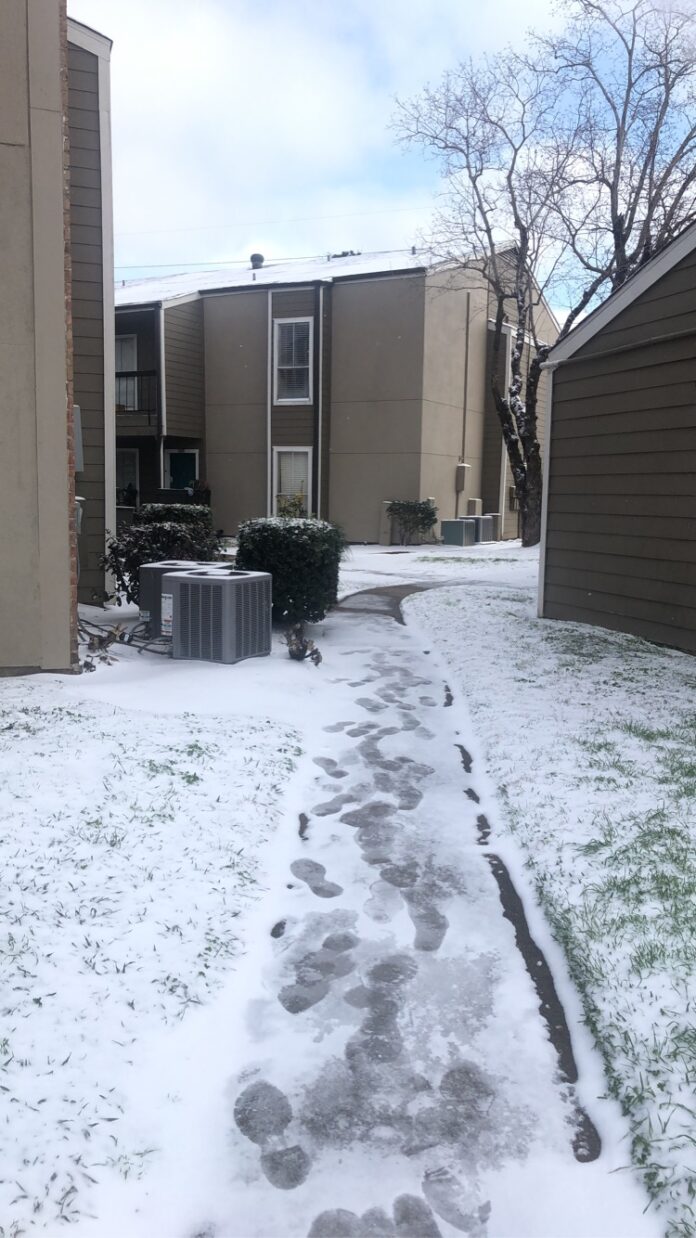Snowfall began in Texas Feb. 15, marking the start of a winter storm that caused a statewide crisis. Texans faced harsh weather conditions without water or power due to the state’s failure to weatherize the power grid in anticipation of extreme weather conditions. Citizens were still under boil water warnings as recently as March 1, nearly two weeks after the storm began.
Daviona Moore (senior), a student living in Houston, said initially the storm did not seem like a significant concern. However, as water pressure lowered and then stopped altogether alongside the power, the stress of the situation reached a crescendo.
“There are so many little intricacies that go into losing power, such as don’t open the refrigerator or else our food might get warm or spoil,” Moore said.
Moore said creative solutions to conserving power and resources were an important part of surviving the storm. She said she was without power for two days, during which she and her partner could not work or attend school. She did not have running water until Feb. 21, for a total of six days.
Moore said she was stressed not only by the lack of power and water, but also by her inability to work. As a senior, the fear of falling behind on her senior comprehensive project, as well as income loss due to being unable to work online, added to her anxieties about the situation.
Dagim Assefa (first year), a student living with his family in Dallas, said his family lost power Feb. 15 and power was not restored to his home until Feb. 19. Assefa said losing power was initially fine, but as temperatures dropped, he became increasingly concerned about his other family members and his two small dogs.
Assefa said he was frustrated to see political figures in Texas deflect the situation and focus on political ideology rather than the needs of citizens throughout the crisis.
“During that week, our governor, Governor Abbott, had the nerve to go on Fox News and lie,” Assefa said. “He lied and said the main source of the power failures was because of renewable energy.”
Texas’ privatized and deregulated power grid was unable to meet the demand for energy under the harsh weather conditions. Despite facing a similar energy crisis in 2011, officials in Texas continued to claim weatherizing the power grid was unnecessary.
Moore and Assefa both said people can help Texans by donating to mutual aid funds.
Emmaline Jeansonne (junior) and Savannah Farmer (first year) are two students with family in Texas who were impacted by the storm. Jeansonne said her family was initially excited for the cold, but they were surprised by how long they lost power and how cold it was.
“On the second or third day, our fish and our fish tank froze and died, which was really sad,” Jeansonne said. “That gives you an idea of how cold it was inside our house.”
Farmer said her family also lost power, and staying in touch was difficult.
“Watching from the sidelines gave me so much anxiety and so much stress,” Farmer said.
Vivian Santiago, associate dean of students and director of student success, said her office sent an email to the entire college requesting academic flexibility for students affected by the storm Feb. 16. Additionally, Rob Flot, vice president for student affairs and dean of students, said his office reached out to all students who had home addresses listed in Texas, but does not know how many students were affected by the storm. Santiago said she only received requests for academic flexibility from a couple of students, and instead prioritized proactively ensuring students flexibility to miss classes and make up assignments. Flot said no students reported issues with requesting flexibility from faculty.
Moore said that although it was stressful being unable to work without power, professors were very supportive.
“Everyone at Oxy was understanding,” Moore said.
Moore said the organizers of the Associated Students of Occidental College (ASOC) Food and Transportation Fund promoted the resource specifically to Texas students following the storm, and application rounds are opened every few weeks. Flot said his office also worked with the ASOC Food and Transportation Fund and his office shared the information about the fund with the student body as well.
“Knowing that ASOC was there for students who were impacted was very reassuring,” Assefa said.
![]()































